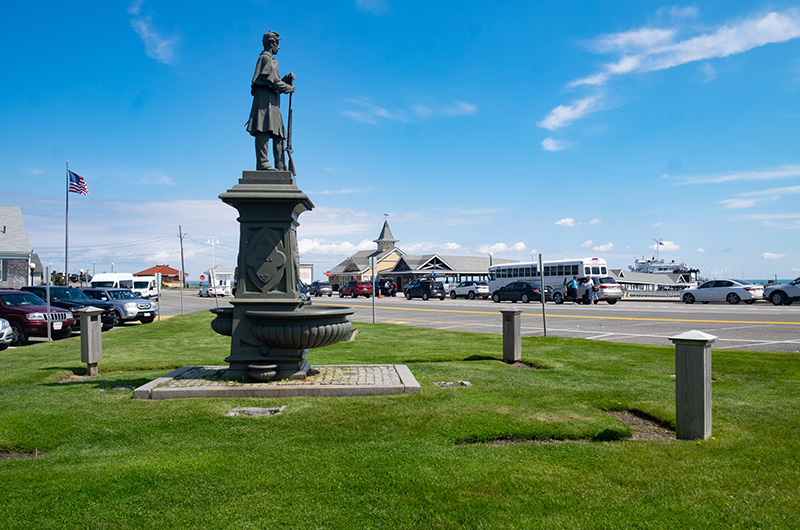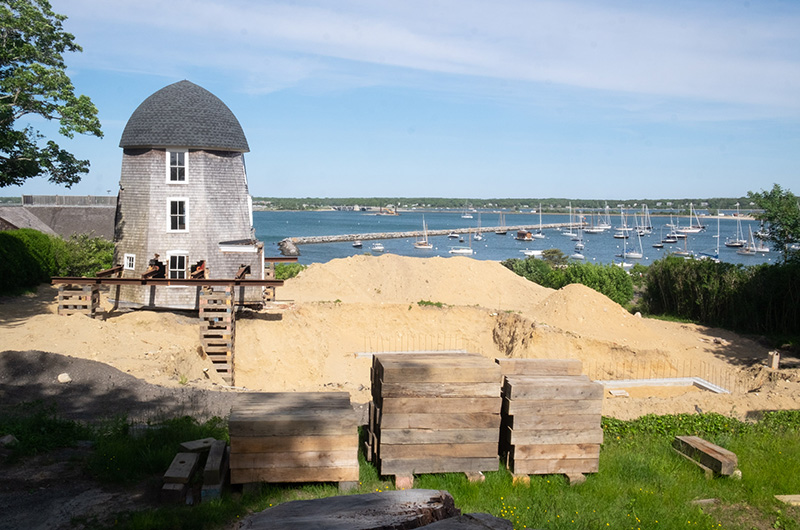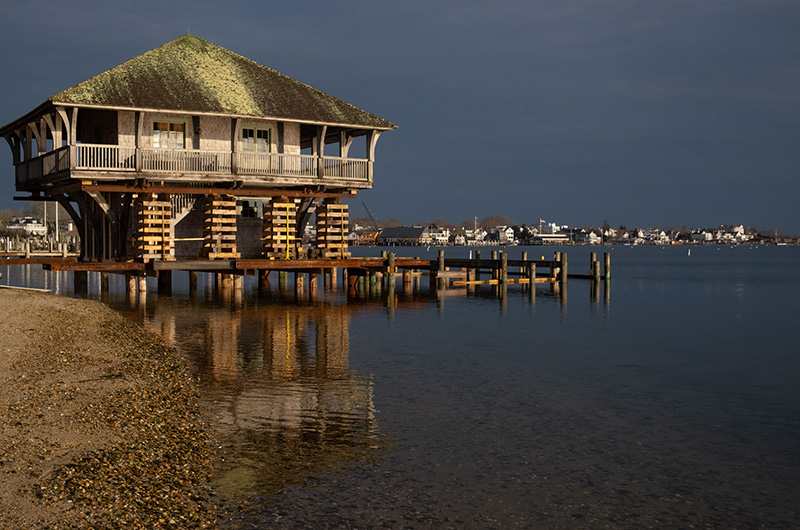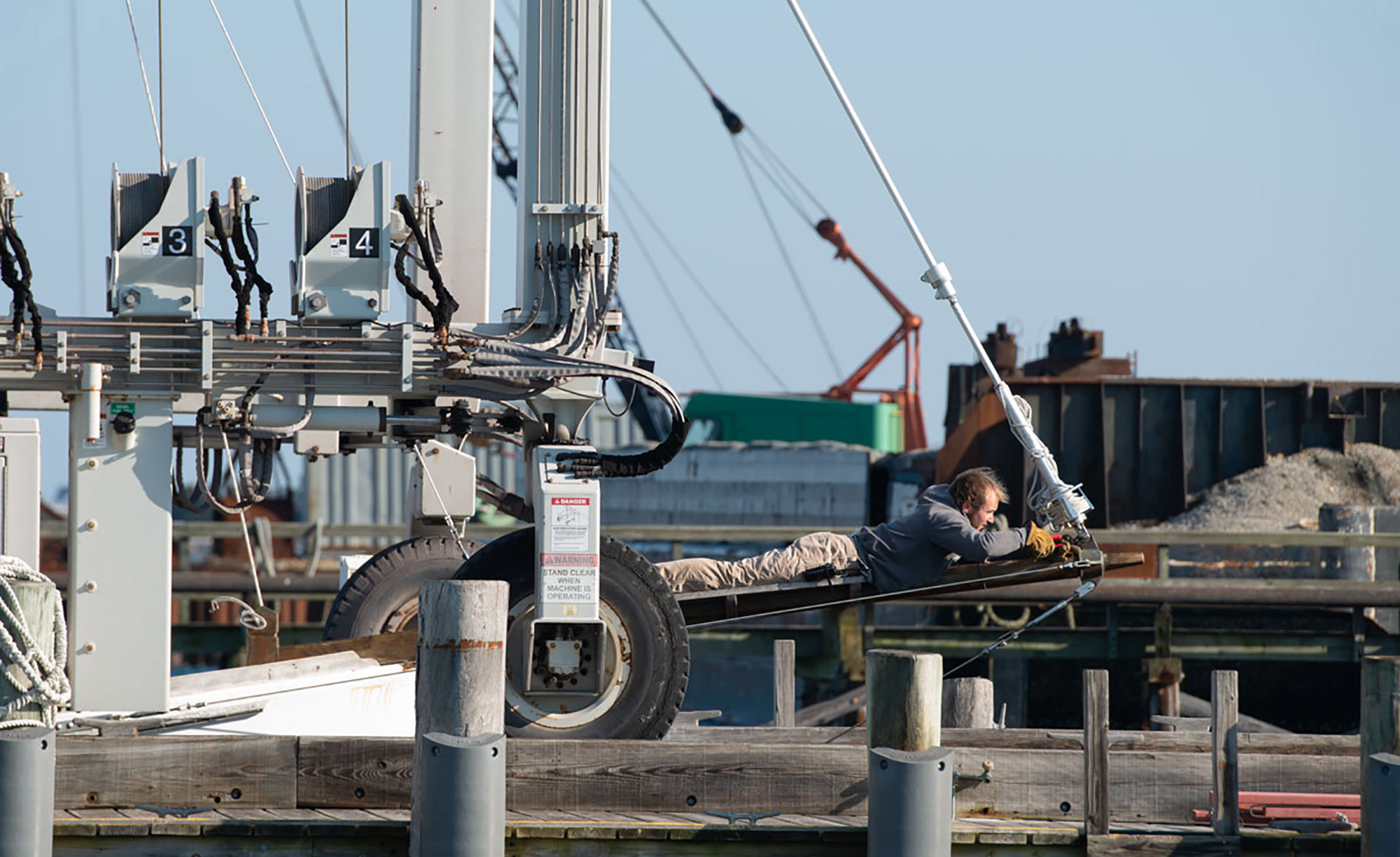It started in an ambulance.
Seniel Hannagan of West Tisbury first began feeling contractions on New Year’s Day, 2019. By 1 a.m., they had become so intense that Ms. Hannagan woke her husband and called 911. Although the ambulance arrived quickly and raced toward the hospital, with neighbor and Tri-Town Ambulance chief Ben Retmier in the back, six-pound, 15-ounce Solstice Hannagan couldn’t wait.
He arrived just before reaching the drawbridge, the first baby born on the Vineyard in 2019.
*
The year that began with an historic, emergency birth would be characterized by crisis and history as well, as an Island that has long been immersed in its own past was time and again forced to confront it.
An 18th-century waterfront house in Vineyard Haven was demolished without review. A World War II dive-bomber, lost for 73 years on the bottom of the Cape Pogue sea floor, was finally brought to the surface. A pair of controversial Civil War plaques that honored Confederate soldiers were removed, and a dilapidated former Marine hospital was transformed into a state-of-the-art museum.
It was a year of anniversaries, of remembrance, of reflection and of response. It was also a year of activism and of youth.
The youngest generation of Islanders passed an unprecedented plastic bottle ban at three town meetings and crowded the leaderboard at the Striped Bass and Bluefish Derby, with the grand prize car going to Aubrey Warburton, who was still six years away from getting her license.
It was a year characterized just as much by Kickstarter campaigns as it was selectmen’s campaigns, with Islanders rallying to support their neighbors in crisis. They worked together to rebuild farms lost in fire and to rebuild lives disrupted by stroke. They funded the start-up of new businesses, just as iconic ones announced they would be closing their doors. They resigned, they retired, they walked out and they went on strike, with picket lines snaking around grocery stores and blocking bus stops.
An eleventh-hour state law to put a tax on short-term rentals sparked a year of confusion and worry in the Island’s still booming summer rental economy, and an unprecedented ground roots movement to use a portion of the funds for an Island-wide housing bank. Although the initiative ultimately fizzled on town meeting floor, it spotlit the issue of affordable housing and spurred discussion about whether the Island had reached a proverbial tipping point.
In 2019, Vineyarders became acutely aware of their Island’s fragility, both environmentally and culturally. Hunters were presented with incentives to increase their take; fishermen were presented with incentives not to.
Vineyard Haven hosted the inaugural Beach Road Weekend music festival, while Chilmark Chocolates closed their doors, leaving the Island deep in the sugar-free doldrums.
And while 2019 was undoubtedly a year of confronting history, it was a year of making history, as well. In December, nearly a year after Katharine Graham’s West Tisbury estate, Mohu, sold for a record $32.5 million, and Caroline Kennedy put her unspoiled tract of land in Aquinnah on the market for $65 million, longtime summer visitor Barack Obama quietly became the first President to buy a house on the Island, purchasing an $11.75 million home on Edgartown Great Pond.
*
In early April, the Mill House stood as one of the oldest homes in Vineyard Haven. By the end of April, everything except the “mill” portion of the house was gone — a cavernous hole in the ground the only reminder of the history once there.
The demolition of the Mill House sparked shock and outrage from town leaders, Islanders and preservationists, with the Martha’s Vineyard Commission taking the unprecedented step of reviewing the demolition retroactively in an attempt to piece together the literal and figurative debris of the teardown. Ultimately, the commission begrudgingly decided in its conditional approval that the homeowner would have to contribute $100,000 toward causes that promote historic preservation.
Then, in early May, researchers from the U.S. Army Corps of Engineers began to extract fragments from a World War II-era bomber plane that crash-landed in the frigid waters off Chappaquiddick during a doomed practice dive in the winter of 1946. Over the next two months, the history of the plane, its two occupants and the dozens of other crashes that occurred around the Island during the war came into focus. By the end of the excavation, the Army Corps had recovered more than 1,000 different artifacts from the water and confirmed the discovery of human remains. According to a 1946 story written in the Gazette, the plane, known as a Helldiver, was piloted by ensign Cecil Richards and his radioman, William Robert Garrett. Neither were a day older than 21.
Vineyarders also confronted a different difficult history in 2019, with Oak Bluffs selectmen deciding after months of debate to remove two plaques from a Civil War statue that referenced Confederate soldiers.
*
Perhaps the biggest step the Vineyard took toward preserving history in 2019 came on a different hill overlooking Vineyard Haven harbor. After nearly a decade of planning, two years of construction, over $30 million in fundraising, and the complete restoration of exactly 1,008 refractors on the Fresnel lens, the Martha’s Vineyard Museum opened to the public in early March.
Other nonprofits on the Island also took steps to overhaul their facilities. Martha’s Vineyard Community Services received approval from the commission to commence a three-phase, $17 million project to build a new campus at their current location in Oak Bluffs. Over in Edgartown, the Boys and Girls Club entered into an agreement to purchase approximately 21 acres of land near Westside Cemetery for a new facility. The Yard was green-lit by the commission to proceed with its own multi-million dollar expansion. And in early December, the Martha’s Vineyard Hospital entered into an agreement with the Norton family to purchase a parcel just off the Edgartown-Vineyard Haven road for a new nursing home and elder care facility.
Camp Jabberwocky, a one-of-a-kind sleep-away camp for people with developmental disabilities, spent the winter building its campers a new, $2 million facility with a brighter dining hall, screened porch and dedicated infirmary. When it opened in the summer, campers all agreed — the Jabberwocky makeover was brillig.
Fifty years after Chappaquiddick, 2019 served as an opportunity for remembrance and reflection, but also as an opportunity for response to some distinctly 21st century challenges.
In early January, representatives from Tetra Tech began testing wells in homes around the airport for Per and Polyfluoroalkyl (PFAS) contaminants, a chemical used in firefighting foam which had been identified in late 2018 in 13 private wells on the Island. Meanwhile, the public began to question the airport’s strategic plan that called for $39 million in expansion and redevelopment projects, including a doubling of the size of the terminal building, more hangars for private jets and 549 new parking spaces.
The Steamship Authority also spent much of 2019 dealing with the fallout from a scathing 2018 independent consultant’s report that cited an entrenched culture and lack of strategic vision at the ferry service, calling for top-down change after a string of breakdowns last year. Throughout the year, criticism surrounded every decision the boatline made, from its painstaking process to develop a mission statement to its controversial, $60 million plan to overhaul the Woods Hole ferry terminal.
*
Weeks before the beginning of the school year, families were informed that the Tisbury School would not be opening because toxic chemical testing had revealed elevated levels of lead in dozens of the school’s classrooms. The announcement led administrators to delay school by one week and separate children by age groups, with kindergarten through fourth graders attending class in a blocked off portion of the building and fifth through eighth graders using the regional high school. Hundreds of parents crowded normally empty school board and selectmen’s meetings, calling for resignations as they worried about the safety of their children.
Eventually, a plan came into focus, and the school community united in their support to undergo immediate remediation and present plans for a new building at the 2020 town meeting. School superintendent Matt D’Andrea has said that the kids will be reunited after New Year’s.
Crisis was also felt in the workplace, as employees at two critical Island organizations walked off the job to protest wages, benefits and safety.
In April, Stop & Shop workers received word that their union had authorized a strike, abruptly forming picket lines outside their stores and leaving half-pound piles of roast beef and turkey on the butcher scales.
Then, in July, after months of threats, 21 full-time VTA drivers walked off the job, protesting the lack of a permanent contract from their employer company, TCI. The strike shook the Vineyard during the summer, revealing deep divisions among the VTA’s normally docile board members, a groundswell of activism in support of the drivers and measures to maintain routes during the transit authority’s busiest season.
Three weeks into the strike, the two sides finally agreed to a contract. Although drivers promptly returned to the wheel, the VTA responded with cuts to winter routes and fare increases on their summer ones, looking to balance a $1 million budget deficit.
*
The Island faced crises of all forms in 2019, from fire to hunger to homelessness, forcing Vineyarders to come together in the wake of disaster in a way that only they know how.
In March, a devastating, pre-dawn fire razed the historic barn at Flat Point Farm in West Tisbury, claiming the lives of almost 90 animals — including 50 chickens, 22 lambs, 12 sheep and two cattle. But the Island rallied in response, delivering feed and hay in the immediate aftermath of the blaze and donating $120,000 in an online fundraising drive. In September, an Amish work crew raised a new barn in a matter of days.
When a fire in January gutted the inside of Menemsha Market, the iconic general store, Tri-Town Ambulance personnel rushed to quell the blaze. However, it was too late, and the market had to be closed for the 2019 summer.
Also on the fundraiser concert circuit were multiple musical benefits to help Island singer Sabrina Luening, who suffered a stroke this fall, raising over $20,000 to help pay her medical bills.
During the coldest months of 2019, a program from the Vineyard’s Food Equity Network provided soup from Island chefs to some of the Vineyard’s hungriest residents, highlighting a blossoming food equity movement on the Island, the introduction of an in-vessel composter at Island Grown Initiative, and the organization’s distinction of winning the 2019 Creative Living Award.
The Martha’s Vineyard Savings Bank pledged $1 million to Community Services’ new campus, the largest gift in its 110-year history, while the Doris Duke foundation gave the Yard a $350,000 grant for its bold education and dance programs. And state Sen. Julian Cyr announced a $200,000 state earmark to conduct a comprehensive housing and homelessness prevention plan, just as Island Housing Trust and Harbor Homes announced that they had made an offer to purchase a house for Islanders at or below 30 per cent of median family income.

Susie Wallo, who co-runs the Island’s Red Stocking Fund, received the 2019 Spirit of the Vineyard award.
*
In 2019, most Vineyarders agreed that the greatest existential threat facing the Island came from the challenges posed by climate change. That threat was felt most directly in the bizarre weather systems that visited the Island throughout the year, from an unusually warm and dry winter to an unusually wet and stormy fall.
A freak hail storm dropped Dippin’ Dots-sized ice pellets on Edgartown in June and a burst of extreme weather in July resulted in rare tornado warnings, washing boats onto the Eastville shore and leaving the jetty in tatters. A weeklong heatwave, of course, immediately followed.
Then, in October, a three-day gale stalled over the Vineyard, cancelling ferries, felling trees and battering the Island with constant winds upward of 50 miles per hour.
Unusual and perplexing environmental issues also extended into the animal kingdom. A brown bat tested positive for rabies in March, and 13 New England cottontail rabbits were introduced to Noman’s Land in an attempt to reestablish the native breed. A family of barn owls moved into Felix Neck, even as others were found dead around the Island. And sadly, a mysterious case of paralysis left six young deer without the ability to move their legs. Investigations into the matter remain ongoing.
In May, a camera captured the second confirmed live sighting of an Eastern coyote on the Island, stirring concern among Islanders that the wily canine’s inevitable range expansion from Naushon and Cape Cod had begun. And in July, at the height of the summer and only days before shark expert Greg Skomal’s sold-out talk at the Whaling Church, Edgartown officials confirmed the sighting of a shark fin about 20 yards off the South Beach shore.
Fishermen felt their changing environments first-hand in 2019. A year-long saga to change catch limits for the North Atlantic’s dwindling striped bass stock culminated in rules that mandated an 18 per cent cut in commercial and recreational harvest quotas for the 2020 season. The iconic Striped Bass and Bluefish derby changed its size regulations for stripers and saw some of its worst catch numbers in decades, as the bonito came early and the albies barely came at all. And, ironically, an increase in competition from abroad, as well as a saturated stock at home, caused the Island’s tuna industry to spiral into freefall.
Hunters, in an opposite sense, also felt those changes. With awareness for tick-borne illness increasing, bow hunters were offered a financial incentive for the first time ever to take more deer in an attempt to decrease the size of the herd.
*
As the threats of climate change become more acute, the Martha’s Vineyard Commission wrestled with a handful of development projects over the course of the year, drawing previously unexplored lines in the sand between growth and conservation.
Early in the year, the commission approved two undersea cables that will connect to Vineyard Wind’s $2 billion, 84-turbine wind farm 14 miles south of the Island, deciding that the project’s net clean-energy benefits outweighed its environmental impact. But Vineyard Wind’s approval at the commission belied their troubles elsewhere. The Edgartown conservation commission, after hearing hours of emotional testimony from dozens of independent Island fishermen, denied the project on the grounds that it presented substantial environmental unknowns. One day later, the federal permitting agency BOEM delayed their environmental impact statement on the project, instead promising to review the cumulative impacts of all offshore wind development. Although Vineyard Wind eventually reached a settlement with the ConCom, BOEM still has not released the impact statement, delaying the project and putting substantial federal tax incentives at risk.
The commission also heard plans for a proposed 36-lot market-rate subdivision in Edgartown — the first of its kind to come before the body in decades. After Island critics sounded off against the project, the off-Island developers went back to the drawing board (not once, not twice, but three times) before bringing a modified plan before the commission that included elderly housing and over $1.5 million in affordable housing mitigation.
A commission subcommittee, however, recommended denial, saying that the project was still too dense. A public hearing is set to re-open on the development in early 2020.
And in an unprecedented chain of events this spring and summer, the commission scheduled, heard and voted on a project with no applicant present. After the Supreme Court affirmed their sovereign right to gaming in town of Aquinnah, the Wampanoag Tribe of Gay Head (Aquinnah) finally broke ground on a class II gambling facility in early March, clearing four acres of land off Black Brook and State Roads and announcing a 10,000 square foot facility with 250 electronic games.
Faced with few options, the town decided to take the Hail Mary step of going back to court, arguing that an earlier decision required the tribe to get local and state building permits before starting construction. In a stunning turn, a federal district court judge agreed, slamming the breaks on the project while the commission denied the casino development on the grounds that it did not have enough information to approve it.
Throughout the year, tribal leadership remained steadfast in their assertion that tribal sovereignty meant they didn’t have to participate in any local or state review. They have appealed the federal court decision to the U.S. Court of Appeals. A hearing date has not been set.
Elsewhere, the Vineyard Haven working waterfront came into focus, as R.M. Packer’s company was fined upwards of $1 million for environmental violations while development projects at the Martha’s Vineyard Shipyard and former Hinckley’s property entered public discourse.
*
The year defined by its tenuous relationship with history also experienced its fair share of heartwarming moments. Steve Amaral finally received his medals, half a century after serving in the Korean War. Betsy Larsen was celebrated with a surprise flash mob, half a century after serving her first shift at the iconic family fish market.
In sports, the Island continued to see remarkable success. The regional high school girls tennis team extended their half-decade of dominance, capturing a fifth state title in a row. The boys track team, led by senior captain Peter Burke, won the Division II state championship. Basketball coach Mike Joyce won his 200th game, and Mackenzie Condon became the first Vineyard female to win an all-state title, placing first in the pentathlon. The next Friday, she signed with Harvard.
In addition to local success, Vineyarders also achieved acclaim on a national level. Summer residents Spike Lee and Peter Farrelly won Oscars. Tony Shaloub won another Emmy. Noah Glasgow took his science fair to the next level after winning the Massachusetts state title. David Stanwood was inducted into the piano hall of fame. And Grey Barn’s Prufrock got a silver medal at the World Cheese Awards.
Figures of national significance made their presence felt on the Vineyard throughout the summer. Presidential candidate Pete Buttigieg sold out the Performing Arts Center. Congressman Adam Schiff sold out the Whaling Church. Scientist Phil Duffy gave a grave prognostication for climate change; John Kerry discussed solutions. Parkland shooting survivors talked about their traumatic experiences. Dr. Ruth talked about sex.
The year also saw long-time public servants and valued community members retire. Edgartown building inspector Lenny Jason hung up his hard hat; Oak Bluffs shellfish constable David Grunden hung up his waders. Tisbury selectmen Tristan Israel put away his pen and took out his guitar; clerk of courts Joe Sollitto gave up his coveted parking spot and took over as the parade Grand Marshall. John Stevens bid the Edgartown school goodbye; David Norton exited the Chilmark fire department; Nelia Decker retired from to the West Tisbury library. And veteran’s agent Jo-Ann Murphy became a veteran of that job, too.
Island Entertainment, a final holdout in the Netflix era, rented its last film.
The Island also lost some of its most valued residents. Friends and fans on and off-island were shocked and saddened by the death of writer Tony Horwitz at age sixty, honoring him, his wife and his son with a tearful memorial in the summer. Acclaimed journalist turned novelist Ward Just died at age 84. Edgartown residents organized a jet-plane flyover for war hero, former selectman and town father Ted Morgan. And over 500 people packed the Hebrew Center to honor the life of high school student Davin Tackabury, while thousands more mourned a life lost too soon.
*
One year after Solstice Hannagan was born just short of the Beach Road drawbridge, the kid who couldn’t wait is about to celebrate his first birthday. According to his mother, he’s still a handful, just like he was on the day he was born: wild, fearless, an adventurous eater and a great younger brother.
“He’s pretty much your average one-year-old maniac,” Ms. Hannagan said.
Ms. Hannagan said that she already has plans to open the New Year with a photo shoot at the drawbridge, including the emergency services personnel who got her through that night one year ago. She can’t believe it’s already 2020.
“It feels like it was yesterday,” Ms. Hannagan said.














Comments (2)
Comments
Comment policy »